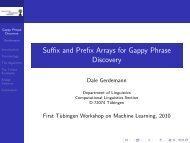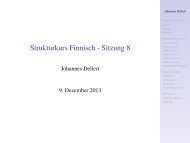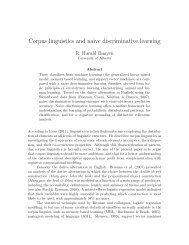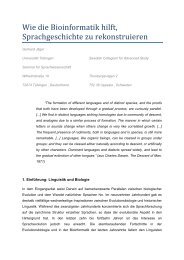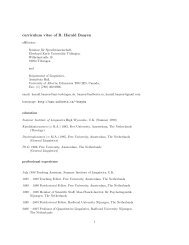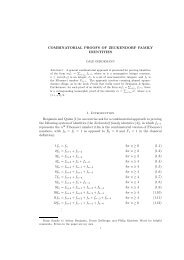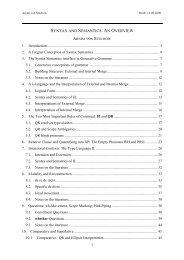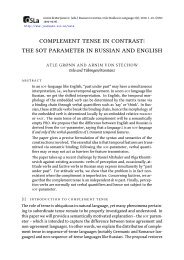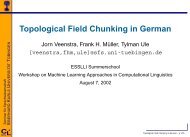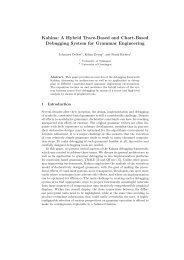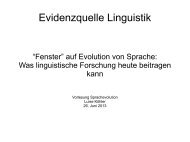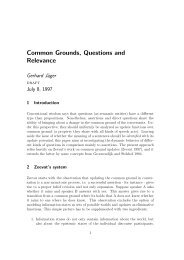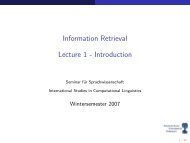A Treebank-based Investigation of IPP-triggering Verbs in Dutch
A Treebank-based Investigation of IPP-triggering Verbs in Dutch
A Treebank-based Investigation of IPP-triggering Verbs in Dutch
You also want an ePaper? Increase the reach of your titles
YUMPU automatically turns print PDFs into web optimized ePapers that Google loves.
Logical Form Representation for L<strong>in</strong>guistic<br />
Resources<br />
Rodolfo Delmonte<br />
Department <strong>of</strong> L<strong>in</strong>guistic Studies & Department <strong>of</strong> Computer<br />
Science<br />
Ca’ Foscari University <strong>of</strong> Venice<br />
Email: delmont@unive.it<br />
Website: http://project.cgm.unive.it<br />
Abstract<br />
Logical Forms are an exceptionally important l<strong>in</strong>guistic representation for highly demand<strong>in</strong>g<br />
semantically related tasks like Question/ Answer<strong>in</strong>g and Text Understand<strong>in</strong>g, but their<br />
automatic production at runtime is higly error-prone. The use <strong>of</strong> a tool like XWNet and other<br />
similar resources would be beneficial for all the NLP community, but not only. The problem is:<br />
Logical Forms are useful as long as they are consistent, otherwise they would be useless if not<br />
harmful. Like any other resource that aims at provid<strong>in</strong>g a mean<strong>in</strong>g representation, LFs require a<br />
big effort <strong>in</strong> manual check<strong>in</strong>g order to reduce the number <strong>of</strong> errors to the m<strong>in</strong>imum acceptable<br />
– less than 1% - from any digital resource. As will be shown <strong>in</strong> detail <strong>in</strong> the paper, XWNet<br />
suffers from lack <strong>of</strong> a careful manual check<strong>in</strong>g phase, and the number <strong>of</strong> errors is too high to<br />
make the resource usable as is. We classified mistakes by their syntactic or semantic type <strong>in</strong><br />
order to facilitate a revision <strong>of</strong> the resource that we <strong>in</strong>tend to do us<strong>in</strong>g regular expressions. We<br />
also commented extensively on semantic issues and on the best way to represent them <strong>in</strong><br />
Logical Forms. In particular, we will discuss <strong>in</strong> detail representations related to three-place<br />
predicates, with special reference to secondary predication.<br />
Keywords: Language Resources, Logical Form, <strong>Treebank</strong> consistency<br />
1 INTRODUCTION<br />
In a number <strong>of</strong> recent papers, the need for a sizable (at least same size <strong>of</strong><br />
WordNet) and publicly available corpus with Logical Form representation has<br />
<strong>in</strong>creased: as a result more and more papers are concerned with the generation<br />
<strong>of</strong> a logical form or a semantic representation that is close to it. The fact is<br />
that there is already a number <strong>of</strong> such resources available, XWN (Moldovan<br />
and Rus, 2001), and ILF (Agerri and Peñas, 2010), hence (AP), both derived<br />
from WordNet glosses: so, why not us<strong>in</strong>g them. After review<strong>in</strong>g previous<br />
work - <strong>in</strong>clud<strong>in</strong>g XWN and WN30-lfs (by Clark et al., 2008) generated by<br />
USC/ISI, California <strong>in</strong> 2006 - AP come to the conclusion that "... there is still<br />
some need for provid<strong>in</strong>g lexical and/or knowledge resources suitable for<br />
computational semantics tasks that required formalized knowledge." (ibid.29)<br />
The problem seems to lie <strong>in</strong> the presence <strong>of</strong> some obscurity <strong>in</strong> the way <strong>in</strong><br />
which the glosses have been transformed: <strong>in</strong> particular, WN30-lfs is<br />
commented by the same authors as conta<strong>in</strong><strong>in</strong>g "... free variables and/or<br />
predicates without any relation with any other predicates <strong>in</strong> the<br />
73



